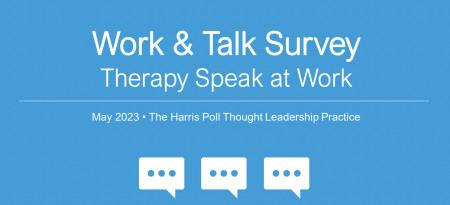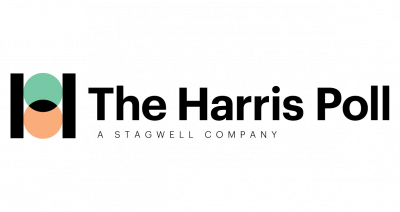New Harris Poll Survey Finds 67% of U.S. Employees Have Experienced 'Therapy Speak' at Work

NEW YORK, May 23, 2023 (Newswire.com) - Two-thirds of American workers (67%) have experienced "therapy speak" at their workplace, according to the "Work & Talk Survey," the latest research from The Harris Poll Thought Leadership Practice, released today. "Therapy speak" refers to an empathetic-sounding language or tone used as a sign of understanding but often fails with appropriate follow-through.
Out of those who said they experienced "therapy speak," 34% said that it came from a direct manager, 33% from company leadership, and 30% from colleagues. The percentage is higher among Millennials, with eight in 10 experiencing "therapy speak" at work (79%).
Within the last year, 66% of workers have experienced at least one kind of a cutback, including layoffs (28%), as well as slashed raises, and bonuses (29%). The survey also shows that 37% suffered from reduced spending budgets, 33% from a hiring freeze, and 28% from announcing layoffs.
"The data clearly points to a disconnect in the workplace. While employers feel they are connecting empathetically, employees are increasingly skeptical of platitudes that are too often used with no follow through," said Abbey Lunney, managing director at The Harris Poll Thought Leadership and Futures Practice.
Employees reported that their employers were very or somewhat insensitive in the way they approached a situation through communication, especially regarding bad news, including when announcing reduced or eliminated raises, discussing autonomy for remote or hybrid work, and communicating about layoffs.
Employer's catchphrases also did not ring true and came across as disingenuous sentiments. Among the worst was "Your feedback is important to us" with 72% of employers using the phrase, and "We're all in this together" used 69% of the time.
"This matters for building strong relationships, retaining employees, and maintaining productivity," Lunney said. "There is an opportunity for more genuine engagement that is thoughtful, compassionate, and human to rise above the 'therapy speak.'"
The survey indicates that employees are seeing right through the communications tactics, and they are becoming increasingly skeptical of their employers' intentions.
- 71% of workers: "I can easily see through my company's ingenuine friendly or empathetic tone in their communications."
- 69% of workers: "It's hypocritical of my leadership to cut corners in my workplace (e.g., decreasing budgets or hiring); while pocketing in a lot of money in bonuses."
- 55% of workers: "I feel like my employer 'listens,' but only to win arguments."
Half of the employees said they are thinking of looking for a new job and have become more resentful and less excited at work. Encountering "therapy speak" in the workplace makes 61% more hesitant to recommend the employer to others, 59% feel less excited about their job, 57% have resentment toward the leadership team, and 55% feel less valued as an employee.
How does this make employee-employer relationships feel more transactional and transitory?
- 60% of workers: "I noticed that my work relationships (e.g., with my boss, colleagues, business partners, or clients) have become more transactional in nature (i.e., everything is strictly 'business') in the last three years."
- 56% of workers: "My company's caring is very short-lived (i.e., there is no follow-through on plans, etc.)."
- 55% of workers: "I don't feel like my employer has my back in difficult situations (i.e., layoffs, reduced or eliminated incentives or benefits, etc.)."
Finally, the survey found eight in 10 employees say communication at work heavily affects how they feel about their jobs. They would prefer an employer that is more genuine and honest.
- 79% of workers: "Communication at work heavily affects how I feel about my job."
- 81% of workers: "I prefer a genuine and honest communication over 'therapy speak' at work."
The survey was conducted online April 28-30, 2023, among 2,075 U.S. adults comprising 810 full-time employees.
For more information, please visit The Harris Poll Thought Leadership Practice or subscribe to their newsletter, The Next Big Think, for the latest research.
About Harris Poll Thought Leadership Practice
Building on 50+ years of experience pulsing societal opinion, we design research that is credible, creative, and culturally relevant. Our practice drives thought leadership and unearthed trends for today's biggest brands. We are focused on helping our clients get ahead of what is next.
About Harris Poll
The Harris Poll is one of the longest-running surveys in the U.S., tracking public opinion, motivations, and social sentiment since 1963, and is now part of Harris Insights & Analytics, a global consulting and market research firm that delivers social intelligence for transformational times. We work with clients in three primary areas: building 21st-century corporate reputation, crafting brand strategy and performance tracking, and earning organic media through public relations research. Our mission is to provide insights and guidance to help leaders make the best decisions possible. To learn more, please visit www.theharrispoll.com.
Source: Harris Poll
